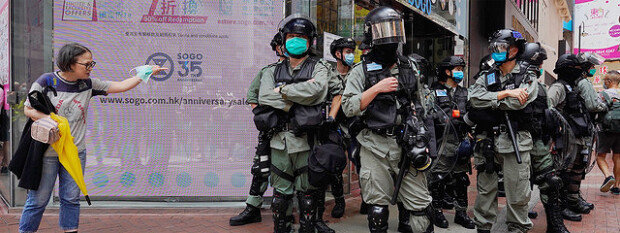Trump mulls strong action against China over Hong Kong
Trump mulls strong action against China over Hong Kong
Posted May. 28, 2020 07:45,
Updated May. 28, 2020 07:45

With China set to vote on its new Hong Kong security law at the end of the 13th National People’s Congress (NPC) on Thursday, U.S. President Donald Trump has suggested that he will take powerful measures in response this week, turning a war of words between the U.S. and China into a real action.
“We’re doing something now,” President Trump said at the White House on Tuesday (local time) about China’s move to impose Hong Kong national security law, adding, “It’s something you’re going to be hearing about before the end of the week.” When asked if it includes sanctions against China, Trump said he thinks it is going to be very powerful.
According to Bloomberg, the U.S. State Department is working on a report examining the autonomous status of Hong Kong and could deprive the country of special status if it thinks Hong Kong is not enjoying a high degree of autonomy. The U.S. Treasury Department is weighing sanctions against China, including freezing assets of Chinese government officials and businesses and restricting visa issuance for Chinese officials.
If Hong Kong loses its special status, there is a high chance it will lead to an exodus of businesses since they will no longer enjoy preferential treatment in tariff, investment, trade, and visa issuance. Trump’s economic adviser Larry Kudlow said Washington would shoulder the cost for American companies coming back from Hong Kong or mainland China. Some experts predict that the U.S. could nullify the phase one U.S.-China trade agreement.
Against this backdrop, Chinese President Xi Jinping told the Chinese military to scale up preparedness for war. According to People’s Daily, the official newspaper of the Communist Party of China, President Xi attended a meeting of the delegation of the People’s Liberation Army and People’s Armed Police Force at the NPC on Tuesday and told them to “safeguard national sovereignty, security, development interests, and overall strategic stability of the country” by dealing with complex situations in a timely and effective manner.
Xi’s remarks appear to be directly aimed at the U.S. China has been asserting that Taiwan and the South China Sea are a core national interest directly related to its sovereignty and will not give in to the U.S. pressure. Beijing has also protested against Washington’s intervention in Hong Kong issues by saying they are Chinese domestic affairs and a matter of sovereignty. Taiwan’s United Daily News reported on Tuesday that two U.S. B-1B bombers and KC-135R aerial refueling aircraft left the Air Force Base in Guam and flew close to Taiwan on their way to the South China Sea by quoting Aircraft Spots, a military air movement tracker. It added the KC-135R flew near Hong Kong on the same day.
Pro-American and pro-Chinese countries have each backed their own ally. Japan’s Yomiuri Shimbun reported that the Japanese government is pushing ahead with a policy banning the use of Chinese information and communications devices at government agencies and public institutions. The UK government has decided to impose sanctions against China’s CGTN over its failure to comply with UK impartiality laws during its coverage of Hong Kong protests. On the other hand, Russia supported China by saying Hong Kong affairs fall within China’s domestic affairs. The Iranian government also expressed its support for the Chinese government.
lightee@donga.com · parky@donga.com







